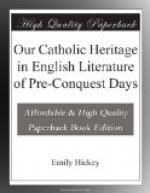Another book that Alfred translated was the History written by a Spanish priest called Orosius, a disciple of St Augustine’s (of Hippo), which “was looked upon as a standard book of universal history.” Alfred by no means gave a literal translation, but used great freedom, and omitted some things and put in others which he judged of greater interest and importance for Englishmen. Alfred enlarged the account of Northern Europe, which he knew a great deal of. He also added the accounts of the voyages of Ohthere and Wulfstan, the former of whom got round the north of Scandinavia and explored the White Sea. Wulfstan’s voyage also was of importance. Both these men told Alfred their stories, and he incorporated them in the History. They came to see him, and Ohthere gave him teeth of the walrus, and no doubt Alfred listened to all they told him, with the keenest interest.
“The account of Ohthere’s voyage holds a unique position as the first attempt to give expression to the spirit of discovery.”
Alfred knew how to use helpers. All who understand the “ought to be” take help as well as give it. The good King encouraged others, and the office of encourager is no mean part of the office of helper. We cannot do our work in the world alone: God meant us to work with others, and man’s best work as an individual can never be independent of the work of others, those who are living or those who have gone before.
Another of the books translated by Alfred was the “Consolations of Philosophy,” by a good and thoughtful Consul of Rome, who was put to death by Theodoric, the Arian King of the East Goths. He wrote the book in prison, and there was so much in it that was felt to be in accord with Christian teaching that some people thought Boethius must have belonged to the body of Holy Church.
A Christian writer, finding a book seeming to possess much of the spirit of Christianity, would naturally study it and frequently use it; and Boethius’s book, with more or less adaptation, grew to be a great favourite with Christians. Its influence can be traced in the work of the greatest Catholic poet, Dante, and in that of the great English poet, Chaucer, who rendered it into the English of his day.
Alfred made the translation definitely Christian. For instance, he writes of “God” and “Christ” where Boethius says “love” or “the good”; and he writes of “angels” instead of “divine substance.”
I will give you one or two specimens of the additions to Boethius with which Alfred is credited.




